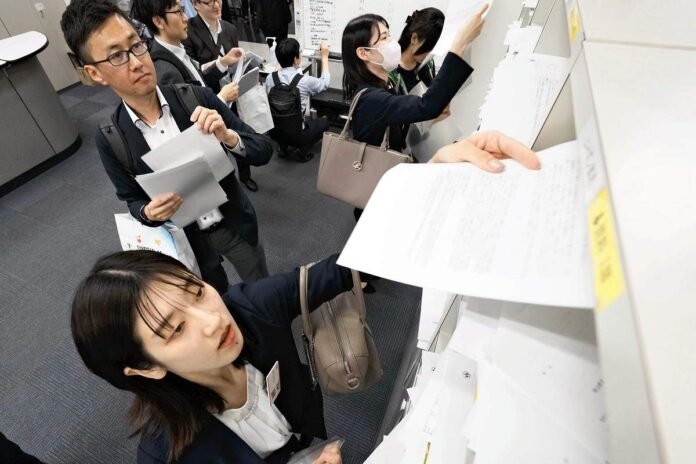Company spokespeople will slide copies of their financial reports into the media shelves of the Tokyo Stock Exchange on Tuesday.
1:00 JST, May 16, 2024
The combined profits of companies listed on the Tokyo Stock Exchange are expected to hit a record for the third consecutive year. The latest set of financial results for the financial year ending March 2024 have been released.
The weak yen, price increases and the post-pandemic resumption of economic activities provided tailwinds. Making good use of those profits, for example by raising wages, is essential for creating a virtuous cycle in the economy.
Upward swing
“The weak yen had a positive effect and profits from our North America operations were quite good,” Shinsuke Minami, president of Isuzu Motors Ltd., said Tuesday during an online press conference on the results.
The truck maker’s final profit reached a record ¥176.4 billion, up 16% from the previous fiscal year.
Automakers have achieved good financial results one after another. Toyota Motor Corp.’s net profit doubled to almost ¥5 trillion. Toyota is benefiting from strong sales abroad, seeing its operating profit rise by ¥50 billion for every ¥1 dollar in value. At the start of the 2023 fiscal year, the average exchange rate was assumed to be ¥125 to the dollar, but the actual figure was closer to ¥145.
According to a tally by SMBC Nikko Securities Inc. 919 of the companies in the Tokyo Stock Price Index (TOPIX) reported reporting their financial results on Monday – excluding financial companies and SoftBank Group Corp. – net profit totaling ¥36 trillion, up 14%. Of these, 309 companies, or a third, posted record profits.
“The weak yen had a positive impact on businesses in general,” said Hikaru Yasuda of SMBC Nikko.
Reasonable earnings
The Japanese economy has suffered from deflation for a long time. Low prices are the norm, and price increases affect sales. However, the weak yen has raised the price of imported raw materials, and prices for a wide range of products have increased. Despite the increased costs, more than a few companies posted profits.
Mitsubishi Electric Corp. increased the prices of its automotive equipment and air conditioning products, resulting in a 30% increase in net profit.
“We negotiated with our customers so that we could make a fair profit, and we received their understanding of our price revisions,” said President Kei Uruma.
Nissin Foods Holdings Co., which raised the price of its Cup Noodles, also saw a 20% increase in net profit.
Another factor was the resumption of post-pandemic economic activities. Tourists have returned after COVID-19 was downgraded to Category V under the Control of Infectious Diseases Act.
East Japan Railway Co.’s net profit doubled as revenue from fares for visitors to Japan exceeded pre-pandemic levels. ANA Holdings Inc. also saw international flight revenues surpass domestic flights for the first time.
The wage rises
Companies have turned their profits into wage increases. According to figures for the 2024 shunto labor management negotiations announced on May 8 by the Japan Trade Union Confederation (Rengo), the average wage increase reached a 32-year high of 5.17%, or 1.5 percentage points higher than in the same period of the year. last year.
“Households will be able to withstand price increases as wages rise,” said Kenji Abe of Daiwa Securities Co. “If products sell well, companies will be able to secure money to raise wages again.”
Some companies have invested profits in supporting their business partners. Toyota Motors will allocate 300 billion yen in the fiscal year ending March 2025 to cover rising costs such as labor and raw materials. The automaker plans to add that amount to transaction prices with parts suppliers and support the digitalization of its business partners.
Exchange rate risks
The depreciation of the yen had a negative impact on some companies. ST Corp., a major daily necessities company, saw net profit fall 30%. The exchange rate caused a sharp increase in raw material costs. The normalization of economic activity also put pressure on shipping performance. Container freight rates, which had skyrocketed due to the logistics stagnation caused by the COVID-19 pandemic, fell. And many general merchandise companies saw their profits decline due to lower commodity prices.
The stagnant Chinese economy also negatively affected the performance of some companies. Industrial machinery manufacturer Fanuc Corp. and Shin-Etsu Chemical Co. also saw their final profits decline.
The 919 companies’ final profits for the fiscal year ending March 31, 2025 are expected to fall 5% from the previous year, the first decline in four years. Just like last year, many companies do not expect significant exchange rate fluctuations at the start of the financial year. The six major auto companies, which boosted overall profits, are also expected to see a decline in profits. They expect an appreciation of the yen and a depreciation of the dollar, and expect an exchange rate around the ¥140 level.
Kohei Onishi of Mitsubishi UFJ Morgan Stanley Securities Co. said: “Sharp fluctuations in exchange rates will be a negative factor for corporate profits. The earning capacity of companies alone may not be sufficient to cover the negative impact.”
Many are also concerned about the future of the American economy. In the April employment report published this month, the number of people employed in non-farm sectors, a figure that reflects economic trends, fell short of market expectations. The American presidential elections in November will also have a major influence on policy.



